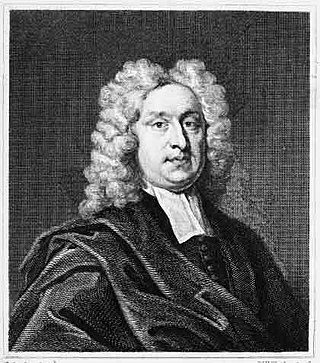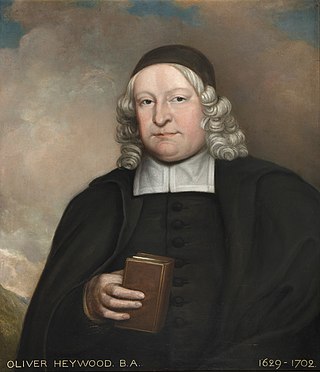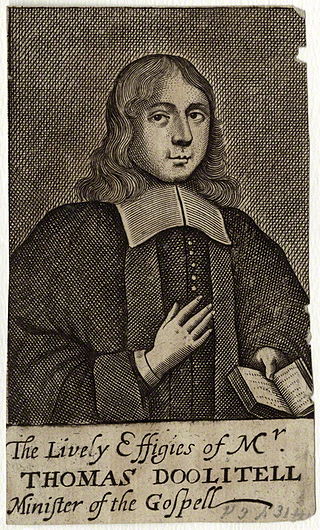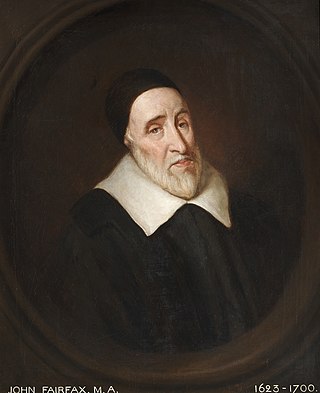James Ashurst (died 1679), was an English divine who lost his living in the Great Ejection of 1662.
James Ashurst (died 1679), was an English divine who lost his living in the Great Ejection of 1662.
Ashurst was vicar of Arlesey, in Bedfordshire, and had been episcopally ordained, but he could not comply with the new impositions of the Act of Uniformity, and hence quit his living. He was very old, and his vicarage slender. Samuel Browne, the judge, was one of his parishioners, and a great friend. [1] "The whole parish", says Palmer (after Calamy),
was well affected towards him for his worthy behaviour amongst them, and was entirely under the influence of the judge . . . and so, though he was legally silenced, he continued in his church a non-conformist. He read part of the morning and evening service, viz. the confession, scripture-hymns, the creed, and some of the collects. He was a considerable scholar and a hard student to the last; greatly esteemed and loved by all sober persons who knew him, for his extraordinary piety, humility, meekness, self-denial, and integrity. His contempt of the world and contentedness on a very small income were very remarkable. He took for his small tithes just what his parishioners were pleased to give him.
— Palmer. [2]
From the register-book of births, deaths, and marriages of the Parish of Arlesey, it is found that Ashurst became vicar between 27 October 1631 and 4 October 1632, and that he was married to Mary Baldocke, widow of Daniel Baldocke, on 20 November 1660. The same register states that James Ashurst, minister, was buried 16 December 1679 ("buried in woolen"). His neighbour, Read, of Henlow, preached his funeral sermon. [3]

The Act of Uniformity 1662 is an Act of the Parliament of England. It prescribed the form of public prayers, administration of sacraments, and other rites of the Established Church of England, according to the rites and ceremonies prescribed in the 1662 Book of Common Prayer. Adherence to this was required in order to hold any office in government or the church, although the new version of the Book of Common Prayer prescribed by the Act was so new that most people had never even seen a copy. The Act also required that the Book of Common Prayer 'be truly and exactly Translated into the British or Welsh Tongue'. It also explicitly required episcopal ordination for all ministers, i.e. deacons, priests and bishops, which had to be reintroduced since the Puritans had abolished many features of the Church during the Civil War. The act did not explicitly encompass the Isle of Man.

The Great Ejection followed the Act of Uniformity 1662 in England. Several thousand Puritan ministers were forced out of their positions in the Church of England following the Restoration of Charles II. It was a consequence of the Savoy Conference of 1661.

Edmund Calamy was an English Nonconformist churchman and historian.
Edmund Calamy the Younger was an ejected minister.

Oliver Heywood (1630–1702) was a British nonconformist minister, ejected for his beliefs.

Thomas Jollie (1629–1703) was an English Dissenter, a minister ejected from the Church of England for his beliefs.
Arthur Jackson (1593?-1666) was an English clergyman of strong Presbyterian and royalist views. He was imprisoned in 1651 for suspected complicity in the ‘presbyterian plot’ of Christopher Love, and ejected after the Act of Uniformity 1662.

Richard Gilpin (1625–1700) was an English nonconformist minister and physician, prominent in the northern region.
William Aspinwall, was a nonconformist English minister.
William Attersoll, was an English puritan divine and author.
Joshua Bayes (1671–1746) was an English Nonconformist minister.
John Bryan, D.D., was an English clergyman, an ejected minister of 1662.

Thomas Doolittle (1632?–1707) was an English nonconformist minister, tutor and author.

John Fairfax (1623–1700) was an English ejected minister.

Samuel Shaw (1635–1696) was an English nonconformist minister.

The Church of St John the Baptist, Bromsgrove is a Grade I listed parish church in the Church of England in Bromsgrove.
Samuel Cradock, B.D. (1621?–1706) was a nonconformist tutor, who was born about 1621. He was an elder brother of Zachary Cradock.
Thomas Calvert (1606–1679) was an English Nonconformist divine in Derbyshire and York.
James Calvert was an English Nonconformist divine.
Ichabod Chaunc(e)y, (1635–1691) was an English physician and nonconformist divine. He was an army chaplain at Dunkirk before 1660, beneficed in Bristol, ejected from his living for nonconformity in 1662, and practised medicine at Bristol from 1662 to 1684. He was banished from England for nonconformity and other offences in 1684, and returned to Bristol in 1686.